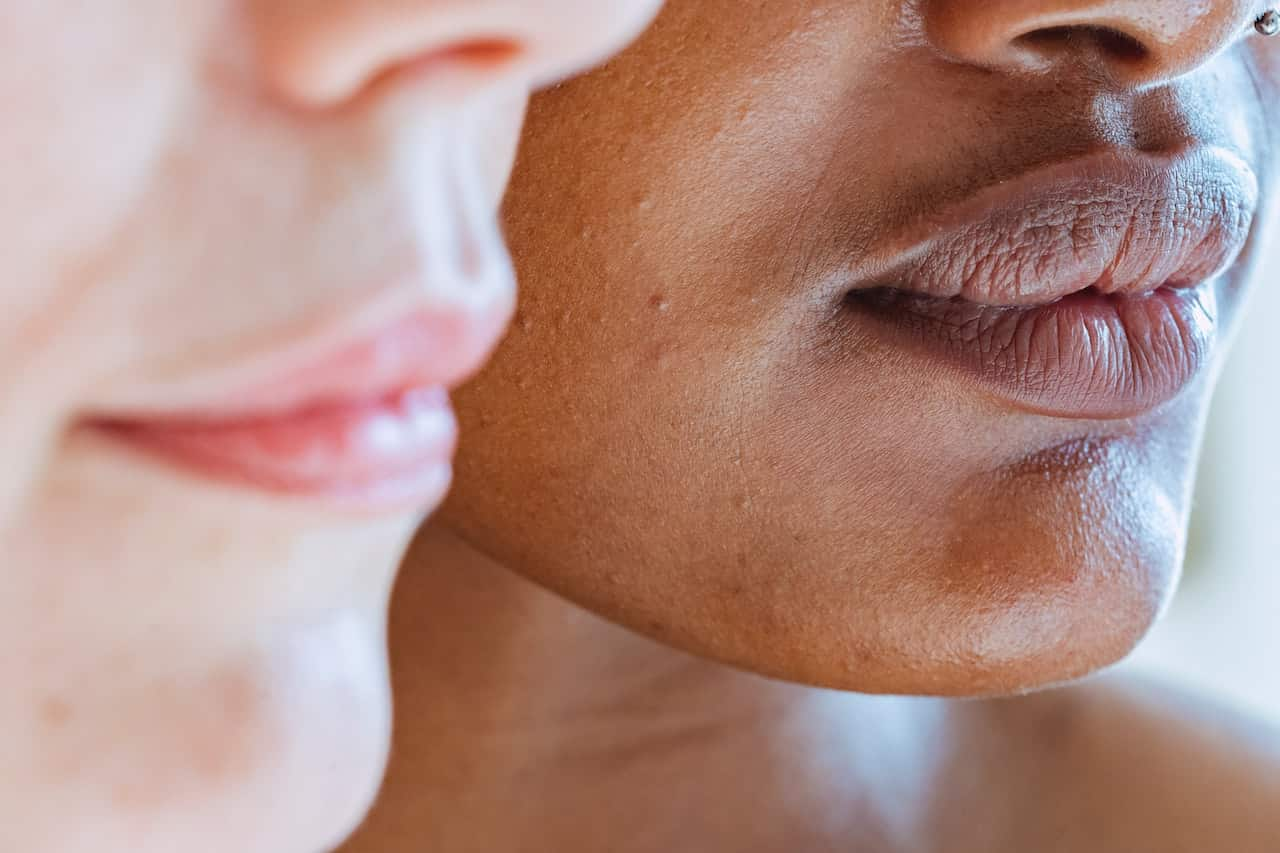Black skin is unique in that it has more melanin. On the one hand, this means we’re less prone to sun damage in terms of the onset of skin cancer and aging. On the other hand, it makes us susceptible to skin problems like hyperpigmentation.
The nature of black skin has implications for our experience with skin care products. For example, when we use products that cause irritation, we’re at a higher risk of hyperpigmentation (dark spots).
Become an insider. Subscribe to our newsletter for more top trending stories like this!
Additionally, commonly used products – usually designed for lighter skin – can also result in hyperpigmentation, necessitating a different approach to black skincare.
This article will discuss the basics of skin care for black people. We’ll show you how to set up a natural routine for your black skin.
We’ll start with a quick recap of the 3 basic steps that most dermatologists agree are common in every skincare routine. We’ll then look at how black people should tweak these basics to care for black skin properly.
People Also Read: Black Hair: Can I Have a Blunt Cut With Layers?

Tutorial: The 3 Essentials of Every Skin-Care Routine
Skin care is a multi-billion dollar industry, and most “experts” who talk about it are always trying to sell you something. As a result, there’s a lot of information out there about what you should and shouldn’t do.
Serum is known to contain active ingredients. To be protected against aggressors on your skin, use antioxidant serum before you start your day.
We’ve reviewed advice from real experts (dermatologists) and boiled the perfect skin-care routine down to three parts:
- Cleansing. You should use cleanser on your skin twice a day, once in the morning to remove the excess sweat and oil that might have accumulated during your sleep and once in the evening to rid your skin of dirt you accumulated during the day.
- Moisturizing. Moisturized skin is glowing, healthy skin, and moisturizing is key in preventing problems like excess oiliness and dryness. As with cleansing, moisturizing creams work best when done twice: before you start your day and before you go to bed at night.
- Protection. Unregulated sun exposure harms the skin, making sunscreen indispensable to proper skin care. After cleansing and moisturizing, always apply a protective layer of sunscreen lotion with a broad spectrum SPF of at least 30. This helps to reduce the sensitivities prone your skin.
Keep in mind that in skin care, simpler is better. Unless you have skin problems to address, sticking to the three essentials above is the best way to care for your skin. Of course, you should also be consistent.
If you have skin problems, you’ll need to introduce a treatment step right after cleansing. In the spirit of simplicity, use the cheat sheet below:
- If you’re dealing with acne, use a treatment product with salicylic acid.
- If you’re combating dry skin, use a treatment product with ceramides.
- If you’re tackling pigmentation problems, use a treatment product with Alpha Arbutin.
- If you’re combating dark spots or trying to lighten your skin, use a treatment product with Vitamin C.
The YouTube video below is the perfect tutorial for the basics of skincare and will shed more light on the treatment part:
People Also Read: 15 Black Health and Wellness Influencers to Follow in 2023
Basic Skin Care for Black Skin
When caring for black skin, what changes?
To answer that question, let’s first highlight the problems that commonly affect dark skin:
- Dark skin is more susceptible to hyperpigmentation — the occurrence of dark spots — for example as a result of acne.
- Dry, dark skin tends to be more noticeable. It may result in an ashy appearance. Dark skin has lower levels of ceramide, which helps the skin retain moisture. As a result, dry skin is more of a problem in Africans.
- Dark circles are more common in people with dark skin.
Worth mentioning is that dark skin doesn’t only have disadvantages. Our skin also has superpowers. For example, we’re less prone to sunburn and skin cancer.
That said, below are considerations that can help you care for your dark skin better.
Mind The Products You Use
The animal that is racial inequality rears its ugly head everywhere. As a result, black consumers have had a tough time finding skin care products suited to their skin. This is one of the reasons Rihanna launched Fenty Beauty — to make beauty products tailored for African Americans.
Most skin care products are made for and tuned to the needs of lighter skin, and when black consumers use such products, it can have undesired consequences.
For example, the typical treatment for hyperpigmentation works by making the skin lighter. If you attempt to treat hyperpigmentation on your black skin by making it lighter, you’ll end up with another problem.
Tackle Problems Like Acne Early
Acne typically leaves dark spots (hyperpigmentation) in its wake. The longer the acne lasts, the worse the dark spots will be.
Become an insider. Subscribe to our newsletter for more top trending stories like this!
For those of us with dark skin, this problem is compounded by the fact that typical hyperpigmentation treatment works by lightening the skin, making our dark spots more difficult to treat successfully.
It’s, therefore, important for us to treat acne early, which minimizes the risk of post-inflammatory hyperpigmentation.
Here’s a video by a Black dermatologist on how to get rid of acne:
Moisturize With Hyaluronic Acid
Because we have lower ceramide levels, our skin doesn’t do so well when it comes to holding moisture in. Fortunately, hyaluronic acid can help by increasing our skin’s moisture retention ability.
Remember, retinol and vitamin B3 are active stimulants of elastin and collagen, these are the proteins that help to prevent lines and skin sagging.
As such, when choosing a moisturizer for black skin, ensure it contains hyaluronic acid. Here’s a comprehensive list of suitable moisturizers for dark skin (face and body).
Listen to the Advice of Black Dermatologists
Black dermatologists are more likely to give advice and treatment that takes into account the uniqueness of your skin. As a result, you’ll likely have more success with the tips and products they recommend.
Also, you’re less likely to suffer negative side effects or worsen the skin problems you’re trying to solve.
Here’s a list of a black dermatologist in every state in the US. They’re highly-qualified professionals dedicated to giving the best care to African Americans.
And if you don’t have a skin problem that would warrant a visit to the dermatologist, it’s prudent to care for your skin to prevent skin problems. One way to do this is to listen to black dermatologists on social media platforms.
Here’s some basic skin care routine advice from one of the most popular black dermatologists on YouTube:
People Also Read: 7 Black Female YouTubers to Follow for At-Home Workouts
Going Natural
Natural skin care products are great because they don’t contain harmful synthetic products, they are good for our sensitive skin. If you want to take an all-natural approach to skincare, all you have to do is find natural products for each of the three essentials of skin care: Cleansing, Moisturizing, and Protection.
There’s a wide range of natural products you can incorporate into your skin care routine, including:
- Cucumber and curd, make face masks which help eliminate blemishes. You don’t use chemical exfoliants.
- Honey, a moisturizer that slows down the formation of wrinkles, leaving you with fine lines.
- Oatmeal, which has remarkable cleansing abilities, opening pores and removing dead skin cells.
- Coconut oil, a moisturizer that can also help remove makeup. Olive oil soothes acne-prone skin.
- Yogurt, which acts as a moisturizer.
- Lemon, which helps deal with pigmentation.
- Milk, which cleanses your skin and makes it soft.
Some of the above ingredients have to be mixed to be effective. Here’s an article explaining how to do that.
For natural sunscreen, choose mineral sunscreens over chemical sunscreens. Mineral sunscreens contain naturally-occurring minerals, which means they’re free of most of the potentially-harmful chemicals found in chemical sunscreens. Check for product labels with zinc oxide as this element forms a barrier blocking sun’s rays. It offers protection against UVA and UVB rays.
Here’s a YouTube influencer sharing her experience with honey-based natural skin care:
Spotcovery offers unique and fresh daily content on Black culture, lifestyle, and experiences. We talk about everything black, black people, black-owned and black-owned businesses. We also deliver authentic and relevant content that will inform, inspire and empower you! The future of black media is a critical piece of the black experience of today! Our primary audience includes African American, African, Afro-Caribbean and people of African heritage. Black culture is for the culture!
Become an insider. Subscribe to our newsletter for more top trending stories like this!





